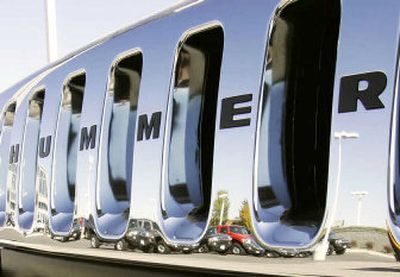They’re not on board

The Thermals, a rambunctious rock band from Portland, were en route between gigs last year when they got a phone call from their label, Sub Pop. Hummer wanted to pay them $50,000 for the right to use their song “It’s Trivia” in a commercial.
“We thought about it for about 15 seconds, maybe,” lead singer Hutch Harris said.
They said no.
Washington D.C.’s Trans Am were offered $180,000 by Hummer for the song “Total Information Awareness.”
“We figured it was almost like giving music to the Army, or Exxon,” guitarist Philip Manley said.
They said no.
The post-punk band LiLiPUT, who broke up more than 20 years ago, could have pocketed $50,000 for “Heidi’s Head” after making close to nothing during their five-year existence. But they, too, said no.
“At least I can sleep without nightmares,” Marlene Marder reasoned.
GM’s brand of luxury SUVs may be one of the most fashionable modes of transportation in the world, but Hummer ad money is turned down like … well … like nothing else. That’s even more shocking when you consider many of the artists in line to benefit could double their yearly income by saying yes. The offers generally begin at $50 grand — a ton of money for relative unknowns.
Lyle Hysen runs Bank Robber Music, a licensing group that pitches songs to film, television and advertisement companies. He’s gotten his clients featured in shows like “Six Feet Under” and “The L Word” and in car ads by Volkswagen and Jaguar.
Hummer, however, has been a nonstarter.
“My standard line is you guys will play a hundred million gigs before you see this amount of money,” Hysen said. “Usually they come back with, ‘We’ll do anything but Hummer.”’
The problems always seem to start with the environment, or rather Hummer’s effect on it.
Hummer has a miles-per-gallon rating pushing single digits (10 in the city for the H2), which has earned it posterboard status in arguments about the United States’ increased dependency on oil. The company defends its fuel efficiency, considering its heft.
But the Sierra Club has led the backlash, even creating a spoof Web site called www.hummerdinger.com. It’s also a descendent of the government-designed Humvee (the civilian model arrived in 1992 after seven years of military duty).
“It’s not about the money,” Manley said. “It’s the principle.”
Dayna Hart, a Hummer spokeswoman, did not respond to requests for comment.
Perhaps it’s easy to understand why these stridently independent artists are passing on Hummer. The more intriguing question is, why is Hummer targeting those artists? Why not ask more mainstream artists who have already embraced corporate financing?
“I will say about the Hummer guys, they are some of the most intense music listening guys out there,” Hysen said. “They are on my A-list. They find music on their own, go to shows, they aren’t waiting for a major label to call them.”